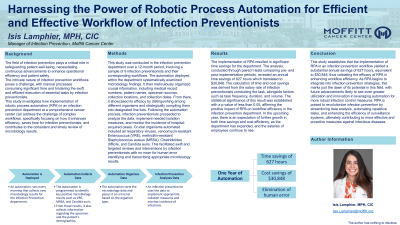Information Technology and Surveillance
Category: Information Technology and Surveillance
ePoster Kiosk Presentation
ITS 95 - Harnessing the Power of Robotic Process Automation for Efficient and Effective Workflow of Infection Preventionists
Monday, June 3, 2024
10:46 AM - 11:15 AM CST
Location: Kiosk 7 - APIC Central, Hall 1

Has Audio

Isis Lamphier, MPH, CIC (she/her/hers)
Manager of Infection Prevention
Moffitt Cancer Center
Presenter(s)
Disclosure(s):
Isis Lamphier, MPH, CIC: No financial relationships to disclose
Background: The field of infection prevention plays a critical role in safeguarding patient well-being, necessitating continuous advancements to enhance operational efficiency and patient safety.
The intricate nature of infection prevention workflows poses a challenge, with manual processes consuming significant time and hindering the swift and efficient execution of essential tasks by infection preventionists.
This study aims to investigate how the implementation of robotic process automation (RPA) in the infection prevention department of a comprehensive cancer center can address the challenge of complex workflows, specifically focusing on how it enhances efficiency, saves time for infection preventionists, and contributes to the consistent and timely review of microbiology results.
Methods: This study was conducted in the infection prevention department over a 12-month period, involving a sample of 9 infection preventionists and their corresponding workflows. The automation deployed within the department systematically examined microbiology findings. It then meticulously organized crucial information, including medical record numbers, patient names, specimen sources, collection locations, and collection dates. From there, it showcased its efficacy by distinguishing among different organisms and strategically compiling them into designated line lists. This facilitated swift and targeted reviews by infection preventionists.
Results: The implementation of RPA resulted in significant time savings for the department. The analysis, conducted through paired t-tests comparing pre- and post-implementation periods, revealed an annual time savings of 627 hours and 30,848 dollars. This substantial gain is particularly noteworthy considering the department comprises nine full-time employees. The statistical significance of this result was established with a p-value of less than 0.05, affirming the positive impact of RPA on workflow efficiency in the infection prevention department.
Conclusions: This study establishes that the implementation of RPA in the infection prevention workflows yielded a substantial annual time savings of 627 hours and 30,848 dollars for the department, validating the efficacy of RPA in enhancing workflow efficiency.
Learning Objectives:
- Upon completion, participant will be able to evaluate the role of robotic process automation in streamlining infection prevention workflows.
- Upon completion, participant will be able to assess the effectiveness of automation in saving time and money for infection preventionists and ensuring consistent and timely review of microbiology results.
- Upon completion, participant will be able to examine potential challenges and benefits associated with automation in infection prevention workflows, fostering an understanding of the technology's implications for healthcare practices.

